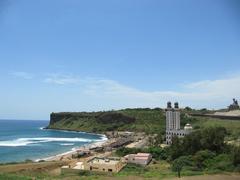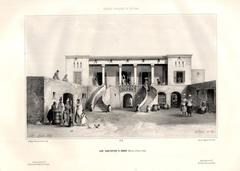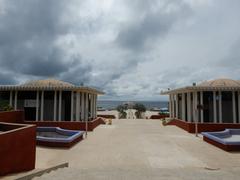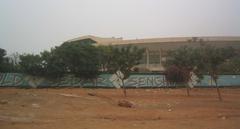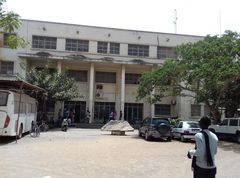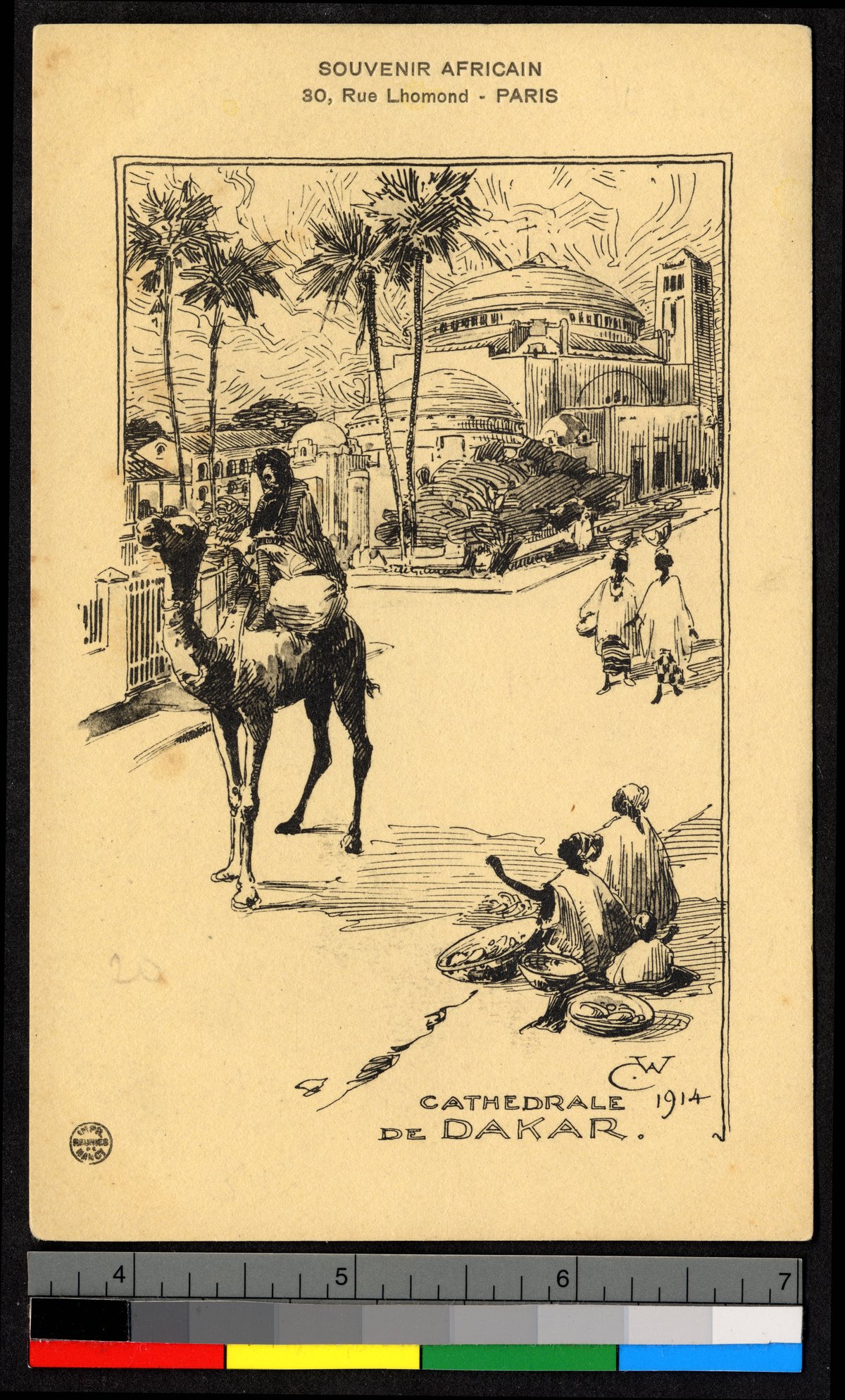
Our Lady of Victories Cathedral, Dakar: Visiting Hours, Tickets, and Historical Significance
Date: 04/07/2025
Introduction
Standing at the heart of Dakar’s historic Plateau district, the Our Lady of Victories Cathedral (Cathédrale Notre-Dame des Victoires) is a remarkable testament to Senegal’s religious heritage, architectural brilliance, and spirit of cultural pluralism. Built between 1924 and 1936 on land formerly serving as a Lebu cemetery, the cathedral honors Senegalese soldiers who fought in World War I and serves as the central seat of Catholicism in West Africa (Wikipedia; La Croix Africa).
This guide provides a detailed overview of the cathedral’s historical background, unique architectural features, and its modern-day significance as a symbol of interfaith harmony. You’ll find essential visitor information, including opening hours, ticket policies, accessibility, and recommendations for exploring nearby attractions.
Table of Contents
- Historical Background
- Architecture and Artistic Features
- Community Role and Interfaith Relations
- Visitor Information
- Nearby Attractions
- Frequently Asked Questions (FAQ)
- Conclusion and Resources
Historical Background
Origins and Construction
The cathedral was constructed during the French colonial period as a tribute to Senegalese soldiers who served in World War I. The land, formerly a Lebu cemetery, was granted to the Catholic Church, symbolizing a significant collaboration between local communities and the colonial administration (Wikipedia). The foundation stone was laid in 1923, and the cathedral was consecrated on February 2, 1936, by Cardinal Jean Verdier, Archbishop of Paris (loger-dakar.com).
Key Historical Events
The cathedral has hosted major religious and civic ceremonies, including the funeral of Senegal’s first president, Léopold Sédar Senghor, in 2001 (HelloTravel). It remains the seat of the Archdiocese of Dakar and a focal point for Catholic life and interfaith activity in Senegal.
Architecture and Artistic Features
Exterior Design
Our Lady of Victories Cathedral is renowned for its eclectic blend of architectural styles—Romanesque, Byzantine, Moorish, and Art Deco—interwoven with indigenous motifs (trek.zone; ArchNet). Its imposing stone façade features three grand arches, a large rose window, and minaret-like towers that nod to Senegal’s Islamic heritage. The 25-meter dome crowns the structure, making it visible across the Plateau district (Lonely Planet).
Interior Highlights
Inside, the cathedral boasts a vast nave, vibrant stained-glass windows from the 1930s, and a high altar adorned with gold-inlaid marble. Mosaics and frescoes—creations of both French and Senegalese artists—depict Gospel scenes and local saints, while wooden carvings and liturgical furnishings blend African artistry with Christian iconography (Senegal Tourism; Atlas Obscura). The pipe organ, installed in the late 1930s, is one of the largest in West Africa and central to the cathedral’s music during major celebrations (ArchNet).
Artistic and Cultural Integration
The cathedral’s décor includes local artistic motifs, multilingual inscriptions, and chapels dedicated to saints venerated in both European and Senegalese tradition. The burial of Cardinal Hyacinthe Thiandoum, the first African Archbishop of Dakar, behind the altar, further enhances its significance (Wikipedia).
Community Role and Interfaith Relations
Senegal is renowned for its tradition of religious tolerance, and the cathedral is a beacon of this ethos. It hosts regular Masses, Marian processions, and community events that draw Catholics and non-Catholics alike (La Croix Africa). Interfaith activities, particularly with Muslim leaders during major religious festivals, highlight the cathedral’s commitment to dialogue and peaceful coexistence (UNESCO Dakar; Vatican News).
The cathedral also supports social outreach initiatives—education, healthcare, and aid for vulnerable populations—regardless of religious affiliation.
Visitor Information
Location and Getting There
Situated at 1, 10000 Boulevard de la République, in Dakar’s Plateau district, the cathedral is easily accessible by taxi, bus, or on foot from other city landmarks (Wanderme). Limited street parking is available; public transport or ride-hailing is recommended during busy periods.
Visiting Hours and Entry
- Hours: Open daily, 8:00 AM – 6:00 PM. Hours may vary during special events or services (Wanderme).
- Entry: Free of charge; donations are appreciated to support maintenance and community programs.
- Guided Tours: Available upon request, offering in-depth insights into history and architecture. Booking in advance is recommended, especially during peak seasons (evendo.com).
Accessibility
Entrances feature ramps and handrails for wheelchair users and those with mobility challenges. Interpretive signage is available in French, English, and local languages. The interior is spacious, though some areas may have uneven flooring due to the building’s age.
Dress Code and Photography
Modest attire is required (shoulders and knees covered). Photography—without flash—is generally allowed, but visitors should remain respectful, particularly during services. Silence or low voices are encouraged inside.
Facilities
Restrooms are limited within the cathedral, but available at nearby cafes and cultural centers. There is typically no official gift shop, but local vendors offer religious items and souvenirs outside the entrance.
Nearby Attractions
The cathedral’s central location makes it easy to combine your visit with other Dakar highlights:
- IFAN Museum of African Arts: Esteemed collection of West African artifacts.
- Museum of Black Civilisations: Celebrated for its exhibitions on African history and culture.
- French Institute: Venue for cultural performances and exhibitions.
- Grande Mosquée de Dakar: Symbol of the city’s religious diversity.
- Place de l’Indépendance: Main square surrounded by colonial-era architecture.
A typical itinerary might include a morning at the cathedral, lunch in the Plateau district, and an afternoon exploring one of the nearby museums (Wanderme).
Frequently Asked Questions (FAQ)
Q: What are the visiting hours for Our Lady of Victories Cathedral?
A: Open daily from 8:00 AM to 6:00 PM. Hours may be adjusted during special events or services.
Q: Is there an entrance fee?
A: No, admission is free. Donations are welcome.
Q: Are guided tours available?
A: Yes, guided tours are available—book in advance for the best experience.
Q: Is the cathedral wheelchair accessible?
A: Yes, with ramps and handrails at the main entrances.
Q: Can I attend Mass?
A: Yes, daily Mass is open to visitors, typically in French with occasional services in local languages.
Q: Is photography permitted?
A: Photography is generally allowed without flash. Please be discreet and avoid taking photos during services.
Q: What nearby attractions can I visit?
A: The IFAN Museum, Museum of Black Civilisations, French Institute, and Grande Mosquée de Dakar are all within walking distance.
Conclusion and Resources
Our Lady of Victories Cathedral is more than a religious building—it is a living symbol of Senegal’s history, unity, and cultural richness. Whether your interest lies in spiritual reflection, architecture, or heritage, visiting the cathedral offers insight into Dakar’s vibrant identity and interfaith harmony. For the best experience, check opening hours, consider a guided tour, and explore the surrounding Plateau district.
For further information, updates on visiting hours, and audio-guided tours, download the Audiala app. Stay connected through our social media channels for the latest on events, travel tips, and insights into Senegal’s most remarkable sites.
References
- Our Lady of Victories Cathedral, Dakar, 2025, Wikipedia
- La Cathédrale de Dakar: Une histoire de foi et de culture, 2025, La Croix Africa
- Our Lady of Victories Cathedral in Dakar, 2025, ArchNet
- Our Lady of Victories Cathedral, 2025, trek.zone
- Our Lady of Victories Cathedral, Dakar, Senegal, 2025, Lonely Planet
- Serving the Same God: Dakar’s Interfaith Relations, 2025, Rich McClear Blog
- Our Lady of Victories Cathedral, Dakar: History, Architecture, Visiting Hours, and Travel Tips, 2025, Loger Dakar
- Senegal Model of Peaceful Coexistence, 2025, UNESCO Dakar
- Our Lady of Victories Cathedral Visitor Information, 2025, Evendo
- Senegal Tourism Board, 2025, Visitsenegal
- Catholic Church in Senegal: Interfaith Dialogue, 2021, Vatican News
- Wanderme: Cathedral of Our Lady of Victories
- HelloTravel: Our Lady of Victories Cathedral


